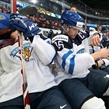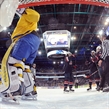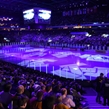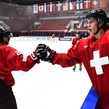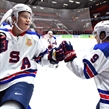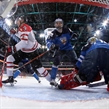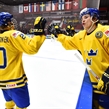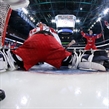In a tense and thrilling climax to the 2016 World Juniors, Kasperi Kapanen's overtime winner at 1:33 gave host Finland a 4-3 gold medal victory over Russia.
Information
Tournament Format
The 10 teams are divided into two, five-team groups in the Preliminary Round.
After a single round-robin series in each group, the top four teams from each group advance to the Playoff Round while the fifth-placed team in each group moves to the Relegation Round.
The top four placed teams from the Preliminary will play a cross-over Quarterfinal game: 1A vs. 4B, 1B vs. 4A, 2A vs. 3B and 2B vs. 3A. The winner of each Quarterfinal moves onto the Semi-Finals.
The winner of each Semi-Final game will move onto the Gold Medal Game, while the losers will play in the Bronze Medal Game.
Relegation format
The two last-placed teams play a best-of-three Relegation Round series. The third game is only played if needed. The winner of the series plays again at the 2017 IIHF World Junior Championship, while loser is relegated to Division I Group A.
Three Point System
For all games points shall be awarded as follows:
- 3 points for the winning team at the conclusion of regulation time
- 1 point for both teams at the conclusion of regulation time if the game is tied
- An additional point earned for the team winning the game in a 5-minute overtime period, or the Penalty Shot Shootout Procedure if the teams are still tied following conclusion of the overtime period
- 0 points for the team losing the game in regulation time
Overtime Operations
If a game is tied at the end of regulation time, a five-minute overtime period shall be played immediately after an intermission of three minutes. The teams will change ends for the overtime period. The game will end when the five minutes has expired or when a goal is scored; the scoring team will be declared the winner. If no goal is scored in the overtime period then the Game Winning Shots Procedure will apply. All overtime periods of any IIHF game shall be played with each team at the numerical strength of four (4) skaters and one (1) goalkeeper.
Overtime procedure in Play-Off Games:
- In case of a tie at the conclusion of regulation time in a Relegation Playoff, Placement Playoff, Quarter Final, Semi Final and Bronze Medal Game, there will be a 10-minute sudden-death overtime period played, following a three-minute intermission.
- The teams will change ends.
- The team, which scores a goal during this period is the winner.
- In the Gold Medal game there will be a 20-minute sudden-death overtime period, following a 15-minute intermission during which the ice will be resurfaced.
- The teams will change ends.
- The team which scores a goal during this period is declared winner.
- If no goal is scored in the overtime period then the Penalty Shot Shootout procedure will apply.
Penalty Shot Shootout Procedure
If no goal is scored in the overtime period then the Penalty Shot Shootout (PSS) procedure will apply. The following procedure will be utilized:
- Shots will be taken at both ends of the ice surface.
- The procedure will begin with three different shooters from each team taking alternate shots.
- Any player whose penalty had not been completed when the overtime period ended is not eligible.
- The winner of the coin toss will have the choice whether his team will shoot first or second.
- The goalkeepers shall defend the same goal as in the overtime period. The goalkeepers from each team may be changed after each shot.
- The players of both teams will take the shots alternately until a decisive goal is scored.
- If the result is still tied after three shots by each team the procedure shall continue with a tie-break shootout by one player of each team.
- The same or new players can be used. The same player can also be used for each shot by a team in the tie-break shoot-out.
- The game shall be finished as soon as a duel of two players brings the decisive result.
- The decisive goal shall be credited to the player who scored and to the goalkeeper concerned.
Tie breaking formula
The tie-breaking system for two teams with the same number of points in a standing will be the game between the two teams, the winner of the game taking precedence.
Due to the fact that the three-point system does not allow a game to end in a tie, then the following tie breaking procedure is applicable when three or more teams are tied in points in a Championship standing.
Should three or more teams be tied on points, then a tie breaking formula will be applied as follows, creating a sub-group amongst the tied teams. This process will continue until only two or none of the teams remain tied. In the case of two tied teams remaining, the game between the two would then be the determining tie-breaker as the game could not end as a tie. In the case of none of the teams being tied, the criteria specified in the respective step applies.
Step 1: Taking into consideration the games between each of the tied teams, a sub-group is created applying the points awarded in the direct games amongst the tied teams from which the teams are then ranked accordingly.
Step 2: Should three or more teams still remain tied in points then the better goal difference in the direct games amongst the tied teams will be decisive.
Step 3: Should three or more teams still remain tied in points and goal difference then the highest number of goals scored by these teams in their direct games will be decisive
Step 4: Should three or more teams still remain tied in points, goal difference and goals scored then the results between each of the three teams and the closest best-ranked team outside the sub-group will be applied. In this case the tied team with the best result (1. points, 2. goal difference, 3. more goals scored) against the closest best ranked-team will take precedence
Step 5: Should the teams still remain tied, then the results between each of the three teams and the next highest best-ranked team outside the sub-group will be applied.
Step 6: Should the teams still remain tied after these five steps have been exercised then Sport considerations will be applied and the teams will be ranked by their positions coming into the Championship (seeding).
Final Ranking
The gold medal game and bronze medal game will determine the final ranking for the top-4 teams. The eliminated teams from the preliminary round plus the losing teams of the quarter-finals will be ranked following their positions in the groups preceding the quarter-final round.
The final ranking will follow the following procedure:
1. Higher position in the group,
2. Higher number of points,
3. Better goal difference,
4. Higher number of goals scored for,
5. Better seeding number
More information
Note: For information only, in the case of discrepancy the IIHF Rule Book and Sport Regulations takes precedence.
Click here to download the IIHF’s Rule Book and Sport Regulations.
History
| Year | Gold | Silver | Bronze | Venue |
| 1977 | Soviet Union | Canada | Czechoslovakia | B. Bystrica, Zvolen |
| 1978 | Soviet Union | Sweden | Canada | Montreal |
| 1979 | Soviet Union | Czechoslovakia | Sweden | Karlstad |
| 1980 | Soviet Union | Finland | Sweden | Helsinki |
| 1981 | Sweden | Finland | Soviet Union | Füssen |
| 1982 | Canada | Czechoslovakia | Finland | Minnesota |
| 1983 | Soviet Union | Czechoslovakia | Canada | Leningrad |
| 1984 | Soviet Union | Finland | Czechoslovakia | Norrköping, Nyköping |
| 1985 | Canada | Czechoslovakia | Soviet Union | Helsinki, Turku |
| 1986 | Soviet Union | Canada | USA | Hamilton |
| 1987 | Finland | Czechoslovakia | Sweden | Piestany |
| 1988 | Canada | Soviet Union | Finland | Moscow |
| 1989 | Soviet Union | Sweden | Czechoslovakia | Anchorage |
| 1990 | Canada | Soviet Union | Czechoslovakia | Helsinki, Turku |
| 1991 | Canada | Soviet Union | Czechoslovakia | Saskatoon |
| 1992 | Soviet Union | Sweden | USA | Füssen, Kaufbeuren |
| 1993 | Canada | Sweden | Czechoslovakia | Gävle |
| 1994 | Canada | Sweden | Russia | Ostrava, Frydek.Mistek |
| 1995 | Canada | Russia | Sweden | Alberta |
| 1996 | Canada | Sweden | Russia | Boston |
| 1997 | Canada | USA | Russia | Geneva, Morges |
| 1998 | Finland | Russia | Switzerland | Helsinki, Hämeenlinna |
| 1999 | Russia | Canada | Slovakia | Winnipeg |
| 2000 | Czech Republic | Russia | Canada | Skelleftea, Umea |
| 2001 | Czech Republic | Finland | Canada | Moscow, Podolsk |
| 2002 | Russia | Canada | Finland | Pardubice, Hradec Kralove |
| 2003 | Russia | Canada | Finland | Halifax, Sydney |
| 2004 | USA | Canada | Finland | Helsinki, Hämeenlinna |
| 2005 | Canada | Russia | Czech Republic | Grand Forks, Thief River Falls |
| 2006 | Canada | Russia | Finland | Vancouver, Kelowna, Kamloops |
| 2007 | Canada | Russia | USA | Leksand, Mora |
| 2008 | Canada | Sweden | Russia | Pardubice, Liberec |
| 2009 | Canada | Sweden | Russia | Ottawa |
| 2010 | USA | Canada | Sweden | Saskatoon, Regina |
| 2011 | Russia | Canada | USA | Buffalo, Niagara |
| 2012 | Sweden | Russia | Canada | Calgary, Edmonton |
| 2013 | USA | Sweden | Russia | Ufa |
| 2014 | Finland | Sweden | Russia | Malmö |
| 2015 | Canada | Russia | Slovakia | Toronto, Montreal |
| 2016 | Finland | Russia | USA | Helsinki |
Tickets
Tickets for the 2016 IIHF World Junior Championship are on sale. Day ticket prices start at €6 for children and youngsters, €11 for adults.
All tickets are sold as venue-based day tickets meaning that one ticket will open doors to all the games played on one day in the chosen venue.
Ticket prices for children under 12 years vary from six to eight Euros depending on the day. There is also a special ticket category for youngsters under 20 years of age: ticket prices vary between 6 and 15 Euros.
For adults, World Junior tickets cost 11-29 Euros for the preliminary round and quarter-finals, 39 for semi-finals and 49 for the final day.
There is also a Prime Seat category for both arenas: best seats from the lower bowl cost between 11-59 Euros, depending on the day.
World Junior tickets are sold by Finnish ticket operator Lippupiste. During the event, ticket sale points will operate at the game venues.
Arena Information
The 13,665-seat Hartwall Arena, which co-hosted games of the IIHF Ice Hockey World Championship in 2012 and 2013 and is the home arena of Jokerit Helsinki, will be the main venue of the 2016 World Juniors. It also hosted the World Championship in 1997 and 2003 and the World Junior Championship in 1998. It’s also the home venue of the KHL’s Jokerit Helsinki.
The Helsinki Ice Hall, home of IFK Helsinki and with a capacity for 8,200 fans, will be the secondary venue for the 2016 World Juniors. This traditional ice rink hosted the World Juniors four times before, in 1980, 1985, 1990 and 2004, and the World Championship in 1974, 1982 and 1991.
The two Arenas are located only two kilometres apart, which means travelling between the arenas is easy and there is a possibility to even attend games at both arenas on the same day.
Hartwall Arena
Helsinki Ice Hall (website only available in Finnish)
Public Transportation
Whether you are catching the game of group A or B, heading back to the hotel after the game or keen to have a day off in Suomenlinna, HSL will take you to your destination.
Directions to Hartwall Arena
Preliminary Round games of group B, two games of the Quarterfinals, Semifinals, Bronze Medal Game and Gold Medal Game are played in Hartwall Arena. The host team Finland is in B-group alongside Russia, Czech Republic, Slovakia and Belarus.
Train is the easiest way to reach Hartwall Arena. All trains departing from or arriving in Helsinki stop in Pasila and it’s only about a 10-minute walk from the Pasila station to the arena.
You can catch train P or train I from Helsinki-Vantaa airport to Pasila, train P being a few minutes quicker. The train station at the airport is only a couple of minutes’ walk from both terminals and the travel time to Pasila is 25-30 minutes.
All trains departing from Helsinki city centre (central railway station) stop in Pasila.
From the city centre you can also catch a bus or a tram to the arena.
Bus 23 departs from railway station and bus 69 from Kamppi. Trams 7A and 7B depart from Lasipalatsi on Mannerheimintie (street) and tram number 9 departs from Kamppi and goes via central railway station. Both busses and trams will take you to Messukeskus stop from which it’s less than a 15-minute walk to the arena
In addition, after the games of team Finland HSL will arrange extra buses to depart from Hartwall Arena. Bus number 30 departs from Veturitie (street) and goes via route Ruskeasuo - Töölön tulli and comes back to the arena. Bus number 50B departs from a stop called “Veturitie H2189” which is on Hakamäentie (street) and its route goes via Pasila to Herttoniemi metro station.
After the final on Tuesday 5th of January there is an extra train from Pasila to Helsinki central railway station. The train departs from platform 5b at 23.30 (11.30pm).
Directions to Helsinki Ice Hall
Preliminary Round games of group A (USA, Canada, Sweden, Switzerland and Denmark), Relegation Round and two games of the Quarterfinals are played in Helsinki Ice Hall.
From Helsinki city centre you can catch either a bus or a tram to the Ice Hall on the street called Nordenskiöldinkatu.
Tramlines 4, 7A and 10 depart from Lasipalatsi every few minutes and go along Mannerheimintie. The stop closest to the Ice Hall is called “Kansaneläkelaitos”. The walk from the tram stop to the arena takes only about 5 minutes.
All bus lines departing from Elielinaukio, next to the central railway station, go along Mannerheimintie and Kansaneläkelaitos is the closest stop to Helsinki Ice Hall on those lines as well.
The travel time from Elielinaukio and Lasipalatsi to the arena is about 15 minutes.
From Kamppi you can catch the bus 69 or a tramline 2. The bus number 69 departs from the platform 72 in Kamppi bus terminal and it will take you straight to the bus stop in front of the Helsinki Ice Hall. The name of this bus stop is “Jäähalli”.
The route of the tramline 2 goes from Kamppi to “Kansaneläkelaitos”-stop. All in all the travel time from Kamppi to the Helsinki Ice Hall is 20 minutes whether you take the tram or the bus.
From Pasila railway station tramline 7B takes you to the Helsinki Ice Hall in 20 minutes. The closest stop to the ice rink is called “Auroran sairaala” on Nordenskiöldinkatu from which it’s about 5-minute walk to the arena.
In addition the bus lines 58, 58B, 69 and 506 go from Pasila railway station to Helsinki Ice Hall. Busses 58, 58B and 506 depart from the stop “Pasilan asema” and you can either hop off at “Auroran sairaala” or “Reijolankatu” - either way it’s no more than 5-minut walk to the arena from the stop.
Bus 69 departs from “Pasilansilta” and it takes you straight to the “Jäähalli” stop in front of the Helsinki Ice Hall. The travel time in total from Pasila to the arena is about 10 minutes.
The best ticket option for tourists is the day ticket, which can be bought for 1 to 7 days. One can travel with a valid day ticket in all busses, trams, trains and metros within borders of Helsinki. The ticket can be bought from HSL online shop (http://verkkokauppa.hsl.fi/), ticket machines at the stations, HSL customer service at central railway station and all R-Kioski -shops in Helsinki.
Also single tickets are available for all HSL-operated public transportation. Single tickets can be bought from a bus, train or tram, from ticket machines at the stations or on mobile ticket app which can be downloaded for androids. The price of the mobile ticket will be added to one’s next phone bill.
More information about the tickets and fares on HSL website: www.hsl.fi
HSL Journey Planner is also great help to find out the route from one place to another:
http://www.reittiopas.fi/en/
Please note that
- On Christmas Eve 24th of December, a Saturday service will operate until about 4pm.
- On Christmas Day 25th of December, a Sunday service will operate from about 11am.
- On Boxing Day 26th of December, a Sunday service will operate.
Pre-Competition Games
The ten participating teams will play the following exhibition games prior to the 2016 IIHF World Junior Championship. Most games will be played during the teams’ training camps in Finland.
| 10 Dec. | 18:00 | Senica (SVK) | Slovakia | - | Germany | 3-5 | |||
| 12 Dec. | 19:30 | Toronto (CAN) | Canada | - | CIS All-Stars | 4-5 SO | |||
| 13 Dec. | 12:00 | Toronto (CAN) | Canada | - | CIS All-Stars | 5-0 | |||
| 13 Dec. | 17:00 | Trnava (SVK) | Trnava | - | Slovakia | 4-1 | |||
| 15 Dec. | Molodechno (BLR) | Dyn. Molodechno | - | Belarus | 4-3 | ||||
| 18 Dec. | 19:00 | Huddinge (SWE) | Sweden | - | Denmark | 5-0 | |||
| 18 Dec. | 19:00 | Amherst (USA) | UMass Amherst | - | USA | 0-4 | |||
| 19 Dec. | 19:00 | Imatra (FIN) | Canada | - | Belarus | 7-1 | |||
| 20 Dec. | 17:00 | Imatra (FIN) | Canada | - | Czech Rep. | 1-0 | |||
| 21 Dec. | 16:00 | Hameenlinna (FIN) | Sweden | - | Slovakia | 6-3 | |||
| 21 Dec. | 19:00 | Hameenlinna (FIN) | Finland | - | Switzerland | 3-4 | |||
| 22 Dec. | 16:00 | Lahti (FIN) | Czech Rep. | - | Denmark | 5-0 | |||
| 22 Dec. | 19:00 | Lahti (FIN) | Finland | - | USA | 2-3 | |||
| 23 Dec. | 15:00 | Kisakallio (FIN) | Switzerland | - | Slovakia | 4-2 | |||
| 23 Dec. | 19:00 | Helsinki (FIN) | Canada | - | Sweden | 7-6 | |||
| 24 Dec. | 12:00 | Helsinki (FIN) | Russia | - | Denmark | 5-0 |
Volunteers
Volunteer recruitment has ended and training sessions started.
The 2016 IIHF World Junior Championship volunteer training sessions have started. The organizer is training almost 400 volunteers to help with tournament operations at Hartwall Arena and Helsinki Ice Hall but also in other tasks like accreditation, ticket sale, content production and transportation.
Volunteers will get an event outfit and warm meals during their shifts. Compensation for travel or accommodation will not be paid.
“We wish to create warm and welcoming event for all participants. Volunteers are a great part of the event atmosphere,” Deputy General Secretary Tuula Puputti says.
Media Accreditation
Media accreditation (written media and photographers) for the 2016 IIHF World Junior Championship is now closed
MEDIA ACCOMMODATION
There are no dedicated media hotels but you will find a variety of options at different price categories here.
Scandic Hotels, one of the official sponsors, has given a general discount code for the event that can also be used by media. Click here for more information.
INTERNET
There will be wireless internet available free of charge at both arenas for media use in the Media Centre & Media Tribune. Dedicated cables can be arranged against a fee, please contact OC media for more information.
TRAVEL
All accredited media representatives with event accreditation are entitled to use Helsinki public transportation free of charge during the tournament. Transportation cards will be given upon arrival together with the credential at the Accreditation Centre. Public transportation schedules for the Helsinki region can be found here.
OTHER INFORMATION
Media facilities will open one day prior to the tournament, on 25 December and close late on the final day, 5 January. More information about media services during the tournament will be provided together with the accreditation confirmation in the beginning of December.
In the meanwhile, please don’t hesitate to contact OC media department:
Henna Malmberg (Media Services in general)
henna.malmberg@finhockey.fi
+358 40 573 7572
Mika Kylmäniemi (Photographer Services)
mika.kylmaniemi@gmail.com
TV Listings
Want to watch the 2016 IIHF World Junior Championship live?
Here's a list of broadcasters:
Belarus: Belarusian TV
Canada: TSN and RDS
Czech Republic: Ceske Televize
Denmark: TV2 Sport
Finland: YLE
Russia: MatchTV
Slovakia: STV
Sweden: SVT and TV4
United States: NHL Network



























































